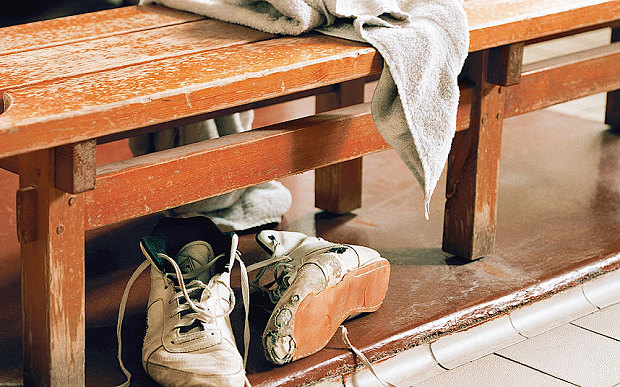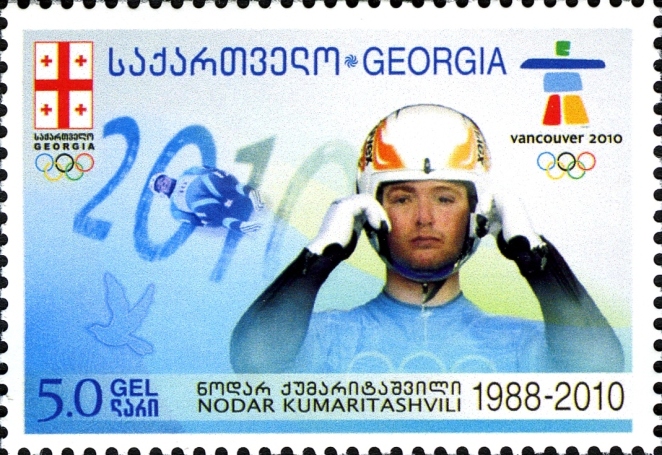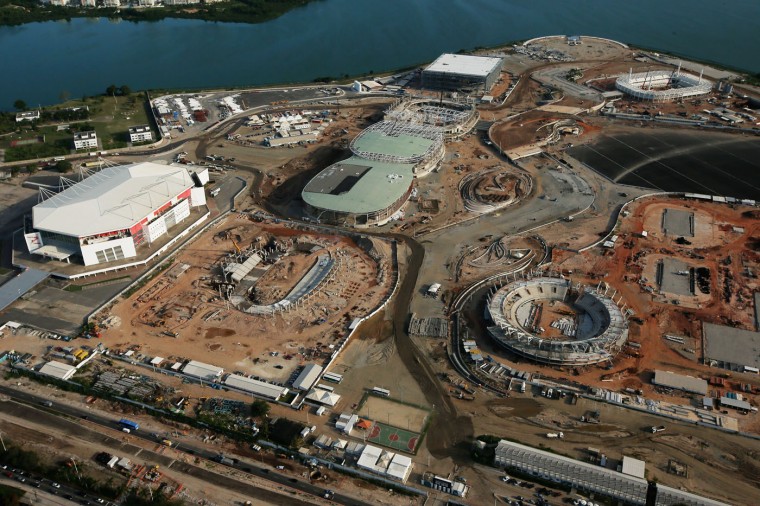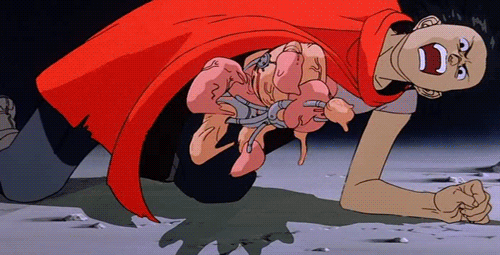Who wants to win the Olympics?
That moment when your host city beams to the world its assertions of civilisation, finds its cultural identity out of a globalised melting pot, celebrates its diversity, reminds us of its historical achievments, and wheels out its mystery celebs. All in a lovely package of inclusiveness, modern thinking, and children. Lots of children – alone, in groups, singing, dancing, being disabled; smiling for months of training till their cute little faces wrinkle preternaturally for the rest of their lives.

But squint again and behind those dazzling teeth and choreographed lightshows is a helluva lot of worry. Will that vast stage behold an architectural and community legacy? Or be a money sucking, windblown embarrassment for decades to come? Will the computers work the show faultlessly, or mechanical breakdown create an epic, global case of schadenfreude? Will we spend too much, drawing negative criticism by the tax indentured populace, or too little, drawing the dubbing of an ‘austerity Olympics’? Or worse – spending loads but having nothing to wow with despite.
Will terrorism raise its underlying head, or freak accidents mar the history? Will corruption claim millions, or worse, be publicly found out to have claimed millions? Will the Olympic spirit wither and die beneath the spotlights?

^Helen Sharman and the Olympic flame, World Universiade 1991. Helen stumbled. Helen is from Slough.
In short the Olympics is like sitting a difficult exam or a lesson in complex public speaking, but with the world watching (and all of history), where every fault is indelible, will cost millions, and draw waves of unabashed laughter and criticism, with people paid to heckle. A merciless stage. Even beforehand the vast roving interest of the world, not unlike the Great Eye of Sauron, will beam down at your preparations, go through your friends list (and ex-friends) launching investigations, reading your old diary and spending a good few hours chortling at your fat photos, or sharing the bit where you admitted to stealing a Boyzone mag off Chantelle Norris.

It is in short a poisoned chalice, your chance to shine, and fall, all over youtube. And it’ll cost you in crippling loans, cancelled holidays, stress, and psychiatrists for the foreseeable future no matter the outcome.
The turning point can be attributed to Athens 2004. Beforehand the huge burning eye of the world’s press was more or less politely unbecoming, or too bored to really pay attention until the big day, with a flurry of activity before everyone sodded off again. But their own chance to shine came with the increasing spotlight on the delayed construction of the Olympic venues as the big day came ever closer. Olympic Committees arrived to study the progress, or lack of, and came away tutting with some stern words on taking it all away, and never investing in olive oil again.

Like a countdown, the papers could get more and more clicks with every update, wallowing in the Greek mess of infrastructure woes, bureaucratic red tape, lazy work ethic and employment rights (the much frowned upon opportunity to strike). Ignoring the fact Greeks work the longest hours in the West, were one of the poorest members of the EU, and have a damned right to have rights (what with the birth of democracy and all that), it was all too sordid and sardonic not to shake ones head or roll our cultural eyes. Even after they completed on time, launched a highly artistic, emotive and epic opening ceremony that’s the template for every one after, and went more or less without global incident or stage blooper (except the bit where the marathon runner from Brazil got rugby tackled by a mad Irish priest, and lost his lead). Still the effortlessly gorgeous conversion of the national stadium by Santiago Calatrava has been the most beautiful yet devised and a testament for decades to come- a lesson in geometry, natural lines and low cost.


Yet we cannot bring ourselves to ignore the perceived ruination of a nation. The Olympic legacy, costing 10,000 Euros of upkeep a week for some buildings to lie vacant, sun-stunned and overgrown. The Handball Arena is now littered with UNHCR tents as use for a refugee camp, while the iconic diving pools lie empty. Or rather we prefer to look at that and ignore the other legacies (such as a highway network, a sparkling new metro and airport etc). Also to look at Greece’s current debt crisis, and put the blame on the elaborate staging, rather than the cook-the-books routine that we all partook in pre-Crisis. To this day news still report on the weed grown facilities looking much like the Classical ruins a metro ride away, despite that countdown long having finished. They will also report unfailingly on libertine passengers not paying on that new metro route.

Then came Beijing 2008, China’s much heralded coming out party with all the fanfare and billions to invest on her make up. And if you thought Greece went through a PR disaster before her debut, China went through a real test of fire, complete with flamethrowers and paparazzi fast on her Jimmy Choo heels. The year according to Chinese astrology would not be a good one from the outset, despite 8 being the number of choice for luck. The Olympic mascots – the Fuwa, or good luck dolls symbolising the ancient Chinese elements of Water, Earth, Fire, Wood and Air- rather became sinister, cursed symbols of disaster that year. The Five Horsemen:

Jingjing the Earth panda, native to Sichuan province, was quickly associated with the devastating earthquake that Spring that wiped out 90,000 lives there. Nini the Air swallow, who looks like a kite, was portent of doom to a highly embarrassing train crash, that killed 40 on the country’s much lauded new HSR (High Speed Rail) network – in Weifang, the ‘kite city’. Yingying the Tibetan Wood antelope saw in the biggest wave of protest and race riots in Tibet since occupation, while Watery Beibei the South Chinese sturgeon, saw in flooding in South China that killed 150 and displaced a whopping 1.5 million. All that remained was Huanhuan the Olympic Fire torch cutey and the protests that dogged him throughout the world, so much so they effectively banned foreign flame routes from thereon. China was literally introducing herself to each member state with a round of publicity to her (in)human rights record; and the Fuwa would forever be known as ‘wuwa’ or witch-dolls after.

As for PR, Beijing did indeed wow the world with a glorious, elaborately staged opening ceremony that gave a soft touch to totalitarian synchronisation, and became the benchmark for all that followed. But even that soon drew criticism. ‘Live’ footage of the fireworks marking out 29 huge footprints across the city to the stadium was widely reported as being faked, thanks to the noticeable onscreen graphics (in reality the fireworks did go off but couldn’t be filmed from above due to danger to the choppers). The insectoid little girl singing the national anthem was found not only to have been miming, but mouthing along to another not-as-sweetie’s voice after a politburo member deemed the vocals substandard (though the girl in Sydney’s previous ceremony, and the norm for all the others, would have been guilty of the same).

Video Grab/Kent News & Pictures Ltd
They did go off, capitalist dogs:

Further controversy followed when it was revealed some members of China’s 56 minority groups showing off their respective national dress were Han Chinese, and not the stated ethnicity (though bear in mind ‘colour-blind casting’ was employed in every ceremony since, from London’s Victorian opening theme to Rio’s historical journey of race). For all China’s trump and glory, it became obvious her detractors would not be missing a beat from the get go.
The Olympics was indeed an overall success: the capital cleaned up and laced herself with state of the art infrastructure, the weather held off, and a memorable Games as could possibly be was beamed to the largest ever global audience of 5 billion. But it also heralded the officialisation of an anti-Chinese rhetoric in the world’s media that continued after the poppers ended. After that mixed year Beijing’s leading Google association became tied to ‘pollution’, rather than being an ancient capital of the world’s biggest population or richest country. Beijing was smog, China was totalitarianism, and its economic rise one to fear, or belittle; its culture aping, uncivilised and enchained. That looked funny and talked funny. It wasn’t the ‘lifting of the sky’ of a billion people on some far off horizon, more a inviting your bling-bedecked Auntie Shazza to a Tuscan wedding.

When London’s turn was up, envisaged protests to Britain’s involvement in the Iraq War to its extensive colonial er, legacy saw its Olympic torch route kept strictly within the host nation for the first time. It was initially dubbed the Austerity Olympics to be held during the global financial crisis -London would be the first city to hold it a third time, but both times before were after the world wars and had effectively defaulted there for minimalised costs. The original plans were billed far lower, despite increasing realisation this would be a last once-in-a-lifetime chance to hold a fully fledged Olympic thingy, rather than yet another bare bones offering involving a big pie to go round and some spirited bunting.

Luckily, it appears the politicians ‘forgot’ to include tax, inflation, infrastructure or contingency funds in their public bid. Nevertheless local protest to the increasing cost of the Games began to garner as the plans began to balloon. Then someone went out and bought a really big bell. In the end it worked out as the second most expensive after Beijing, climbing from initial budgets of under $4 billion to a $15 billion whopper (not including infrastructure).

In the run up to the opening, more criticism – and laughs – came, thicker, leaner, faster. The beds to gangly athletes in the Olympic Village were found to be too short. Northern drivers, bussed in by private firms and refusing to use newfangled technologies such as er, satnav, were lost for hours trying to transport athletes from the airport, as their captives launched their ordeal on social media.
The worst fiasco came when the world’s largest private security firm, G4S, completely failed to deliver for such a sensitive, highly scaled event, with the army stepping in at the 11th hour to cover the shortfalls. The firm had seen its personnel requirements doubled to 23,000- and subsequently demanded an 8-fold payrise from public coffers, from £7.3 million to £60 million, half of which it spent on its gold leafed, water-walking management and only £2.8 million on the extra recruitment, to utter ineffect.

A further show of unbridled commercialisation at the expense of Olympic spirit came when viewers noticed the legions of empty seats at many events, despite all tickets having sold out. They were of course the large amount given over to sponsors and associated members, who never bothered to attend, or spent their time at the bar watching footie or dancing like fat twats in suits.

A final pluck at the strings came with another instance of breakdown. A clock froze during the fencing at the start of the Games, which lead to Shin A Lam unfairly losing a medal, made worse by the decision to uphold the result despite the cause being mechanical failure. It not only exposed the Olympic flaws, but its embarrassing propriety when they muttered painfully to the South Koreans that one has to pay to have an appeal considered. The view of a lone player sitting on an emptied stage, to half an hour of a visibly slow-clapping crowd (to leave the arena means you accept the decision), leaves an imprint.

All in all London did manage to pull off an inordinately successful campaign – the Opening Ceremony – the first section especially- was one of the most memorable of all time, the Games went off without further hitch, and the PR armies of gurning volunteers, an array of citywide cultural events and fun facilities meant it was one of the most enjoyable ever. The legacy of mixed use buildings, and a deprived district now becoming a polished hub ensured no international follow-ups. They even turned a marginal profit thanks to £1 billion of the contingency fund not being needed, and the following year London became the world’s most visited city. As a sign of its confidence, even in the closing ceremony, they included a poignant shot of Shin A Lam sitting in silence as her world burned. Like the Opening Ceremony, it showed not just the rosy image of revision, but the blood, sweat and tears also.

In reality the legacy was a mixed one. For all the much lauded intentions, much of which won London the Games in the first place, they have not been the complete success as widely reported. The route to the Olympic Park remains from day one, as through the city’s largest shopping mall, a festival of money parting and commercialisation; as apt today as it has ever been. The stadium itself was intended to be downscaled and kept for athletics, but the unjustified cost to keep it running led to a complete renege on that idea. And at further cost – adversely dismantling the permanent features while keeping the temporary ones, to the tune of $1 billion, to change it into a football arena as first proposed. FFS.

The legacy of turning a nation to sports – the ‘Singapore Promise’ to “Inspire a generation” was neither fulfilled. The heartrendingly humble video they played at the bidding, of children from all over Britain and the world seeing the Games and one day becoming Olympians, thus underlying the importance of investment in public sport, does not seem to have transpired. Public facilities across the country have closed, school budgets have been axed and sports participation is dramatically down (people playing sport once a week, shrinking by over 200,000 every six months), despite £325 million invested in getting their dimpled arses off the sofa each year by the state quango.

At the end of the day London was a success and an English apple of the eye, but behind closed doors not as amazing as trumpeted. The city does have a legacy, just not so much the one it promised about you know, not staring at the fridge, and changing society n crap. More about lining the pockets of investors and landlords, and fulfilling that raison d’etre of sticking two fingers up at the French.
Neither do the Winter Olympics escape, especially if it’s a non-Western country. Although Western countries do get noticeable concessions. Vancouver 2010 garnered its fair share of critique even before it started following the tragic death of 21 year old Nodar Kumaritashvili of Georgia a few days into practice. Following driver error he hit a steel support pole that should have been protected, on a luge track that was 12% faster than its intended limit. Also marring preparations was opposition from certain First Nations members, advocates to the colonial record of one of the major sponsors – the Hudson Bay Company, the repeated vandalism of the Olympic flame, and the plight of the low-income families displaced by the building projects, none of which were beautiful thanks to budget. These were little reported outside national papers, though the British press did castigate the games as overly nationalistic, in a purported attempt at embellishing London’s follow up.

Vancouver’s opening ceremony heavily featured mechanical failure in a rather sketchy opening show – overall beautiful, alluding to the virginal nature of the First Nations plus a mesmeric song by KD Lang, but also involving an er, stand up comedy sketch, Donald Sutherland as the be-all and end-all of Canadian fame, and a malfunctioning arm of the Olympic flame that denied the opportunity for LeMay Doan to light it. But never mind that, and don’t worry too much about the Georgian unpronounceable either – they gave his family $10,000 to renovate their house in a ‘goodwill gesture’, and Canada’s a nice, civilised Western country anyway, like Britain or Australia. Sydney was great, that was the bestest games ever before all this controversy began (just don’t mention the bribes during the bidding process).

However, Sochi 2014 in Russia truly marked the shining benchmark of public(ised) criticism, the El Dorado for reporters from rival trade blocs the world over. The world’s most exorbitantly spent-on Olympics, costing $51 billion (tick), in a non-Western (tick) populace that can ill afford it (tick), under a charmless dictator-in-all-but-name (tick), with problems with democracy (tick), a lack of gay rights (tick), garnering accordant social media campaign (tick), in a place more famed for its palm trees and the warmest location yet devised (tick). And an unimaginable amount of graft with billions siphoned off to fellow cronies and friends of Putin (tick). Oh and unfinished buildings in the run-up (tick). And of course, a questionable legacy, with which the story can still be milked for decades to come (tick). Let’s just entirely ignore how great, artistic and well organised the show actually was in the end…

Oh Russia, you glorious summit for cultural disdain, you embellished standard of socio-economic disaster, you God’s gift to dash-cam Youtube, you. Oh mystical horizon of fur-lined intrigue and chemical factories, how we have missed you. When one of your Olympic rings failed to bloom in the Opening ceremony our collective hearts swilled with drunken love, and bloomed with laughter. Oh the mirth, uniting peoples the world over, in Olympic based spirit. Add to that the cherry on top of the current doping scandal banning much of the team, and replacing medals all the way back to 2014 – and you’ve got the best ever tally won by a single country, now being taken down by a rung or three. Thank you so much. We feel so much better for ourselves.

Now Rio, you seductress of the south. With your teeming, drug fueled favelas, high profile kidnappings and police shootings. Where to turn the world’s eye – the blinding inequality? Racial politics? High homicide rate and petty crime? The nationwide protests at rising costs and price hikes? The indentured former terrorist / torture victim/ President being impeached? The deepening recession, crumbling the dreams of much of the Developing World? The bacterial gardens of the Guanabara Bay? The unfinished construction? And full circle to Olympic Committee threats to take the Games elsewhere (and never to hold it in a Developing country again)? So much to choose from, so little airtime.

Okay, the ceremony went without a hitch – though there was that little girl, now summarily executed, talking the whole time behind the first Oympic Laureate making his speech. It was evocative, emotive, fun and held its message for a Green Games, plus it’s amazing, eco-friendly Olympic cauldron shining like a gorgeous, mirrored beacon. And the marathon man who got rugby tackled by that Irish priest in Athens 2004, and who lost his winning medal as a result, got to light the flame. Heart warming. Classy like.


But then one of the Olympic pools just turned fart-smelling GREEN, inexplicably so, so wa-hey! We’re back on.

What can we expect from Tokyo 2020? The Japanese are a nice bunch, they’re the sweetest, most polite of peoples, eminently civilised and welcoming, economically great, with a winning allure (food, arts, media) and defining popular culture. Low inequality, high social justice, low crime, high environmentalism. Bullet trains, geishas, anime, Michelin stars, forest cover, zen, bamboo, shrines, cherry blossom, sushi, cat cafes, bunny islands. What could possibly go wrong?

Well the whales, the war, the yakuza, the comfort women, the weirdness. The suicide rate, the groping, the live food, the history textbooks, the depopulation, the porn, the radiation, the homogeneity, the ageing, the Senkaku Islands. Actually this is gonna be fantastic! It may be a time to put down arms, but to take up more civilised, cultured weaponry instead, from social media to trade wars, hacking to drones.

It’s a telling sign their inital logo already got sued by Belgian designer Olivier Debie, forcing a later redrawing:

As we all know the Olympics has traditionally been the time when we all lay down arms and the world stops fighting for the duration of the Games (except in er, WWI, and er, II, and er, every war after that). But anyhoo it’s the thought that counts. The Games are apolitical, yeah. No, I mean no. It’s not a forum to bring up injustice, failure, a few billion dollars, prejudice or scorn. Nosiree.
It’s just our media are increasingly finding the Olympics as a useful tool to promote our own rhetoric, and the superiority of whatever is the regional demagogue du jour. Start off with a good kilo of global audience, add 100g of competition, 100g of emotion, a generous sprinkling of national pride (hell just throw the damn box in), and feed it through a tight nozzle of media interpretation. In hindsight Hitler’s attempt at making the 1936 Olympics a [failed] promotion of his political ideals was a masterstroke so to speak. We’re just here for the mutherfucking cake.

So just think, one day… one day… America just might get it again. Another misty, headline grabbing land ripe with opportunity, hegemony and questionable choices. And what a seasoned gift to the world that would be, inspiring generations of tabloid stories, internet forums and culture bloggers, long in the running. We, as a global community, can once again, dare to dream.

Got to the end? Do comment.
What would you think would happen if your country were picked to host the Olympics? What would your city do well or not so well?

” the homogeneity”
I don’t get it; is Japan/Tokyo bad for beeing homogenous?
In what way would it be better with millions of somalis/afghans/syrians?
LikeLike
Japan stands out (and Korea) as being one of the most ethnically homogenous countries in the world, and a glaring misnomer to its region, of hundreds of ethnic minorities in East and SE Asia (Asia in general really). One measure of a city’s greatness is its ability to attract people from across the world, however Japan has been a more insular nation for the past 300 years, and has stricter immigration laws than its neighbours. This lack of diversity can be seen as a disadvantage in the modern world – higher diversity usually means more creativity, an upwardly mobile populace, a more accepting society and -if immigrant families are taken into account, a fall in crime (unless they form the traditional working class with few opportunities to move up). The unsaid thing is also immigration is in effect a ‘brain drain’ from the rest of the world to one city, usually of the middle classes (even illegal immigrants have to fork out an average $10,000 – $20,000 to afford the boat), and in terms of demographic dividend you get a workforce with few dependents, and without having to have paid for their education and upbringing. This is how successful cities have operated throughout history, from Ancient Rome and Xian, medieval Baghdad, turn of the century NYC, postwar London, to Millennial Singapore, Moscow and Shanghai. The greatest example is of course the immigrant nation of the USA.
Tokyo would hopefully benefit from millions of Somalis/ Afghans/ Syrians provided they were accepted into society and educated as the norm. London would be a good example – Somalis were once the poorest rung of the social ladder, most likely to be on benefits, and were triply disadvantaged by being poor, Black and Muslim during the troubled 1990s when tens of thousands arrived fleeing war and famine. Ethnic tensions between West Africans, Caribbeans and discrimination in the job market added to it all, to the point although common to see African men in business suits (the most successful minority in the city) hardly ever Somalis. However a generation later and Somalis are now one of the most upwardly mobile of the youth, with high university attendance and accordant earnings. They join the ranks of the once-poor Africans, Caribbean, East Asian, Indians and Bangladeshis who now earn more than native British.
If however they were ghettoised, and institutionally discriminated against for generation after generation, the rot in the system would turn the other way – damaging society, and culminating in division, as seen in Britain’s northern cities in the same era, where residential ghettos contrasted with London’s mix.
Japan Today’s article on it:
http://www.japantoday.com/category/opinions/view/tokyo-must-embrace-diversity-and-inclusion-to-avoid-a-bleak-future
To be fair though Tokyo has 700,000 foreigners still, and a large minority with Korean or Chinese ancestries that have lived there for generations, it’s just so big they are watered down by the huge population. The result of all this homogeneity has famously been the rebellion against it. Tokyo during the late 20th Century saw in a flowering of urban tribes, from punks to artists to hippies to surfers to Rockabillies etc that upended the sarariman culture, and although now less so, celebrates its diversity in that way. It is still pre-eminent in many creative industries for example, especially fashion, media and music that dictate to the rest of the world, although falling behind new tech and startups coming from China, that draws from its unofficial empire of cultures.
However all this was not enough to divert the stagnating economy for 30 years, or the crashing birthrates, or lure the great thinkers and workers from abroad that might have changed society. Japan is stuck with a dilemma, it can continue its unofficial policy of isolationism, or open the doors to immigration and change.
LikeLike
Get all the lies in about Sochi like a good radicalized leftist.
LikeLike